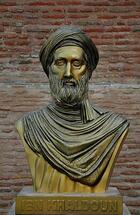
Abū Zayd 'Abdu r-Raḥman bin Muḥammad bin Khaldūn Al-Hadrami (Arabic: أبو زيد عبد الرحمن بن محمد بن خلدون الحضرمي.; Tunis, May 27, 1 332-Cairo, March 19, 1406), known in Spanish as Ibn Khaldún or less commonly as Abenjaldún or Ibn Khaldūn, was a Hafsi Muslim historian, sociologist, geographer, demographer, economist, philosopher and civil servant of Andalusian origin. His best-known work by him is Muqaddima (Arabic: Introduction to Universal History), an early treatise on the theory of history, sociology, demography, and economics. For this reason he is considered the father of the previous disciplines and, in general, of the social sciences in Islamic science.
According to Arnold J. Toynbee "Aben Khaldun conceived and formulated a philosophy of history that is without doubt the greatest work that has ever been created by one person in any time and in any country." There is a record that his manuscripts exist in Spain since before the 18th century (in the palace of El Escorial classified as Ben Mohamad Ebn Khaldun Alhadrami, Granatensi. Ejus epitome theologiae dogmaticae, cui titulus medulla, opus autographum and another cataloged in the BNE ) which makes it possible for this author to have been known since the Middle Ages on the Peninsula, even influential among Spanish scholars such as the Salamanca School.





